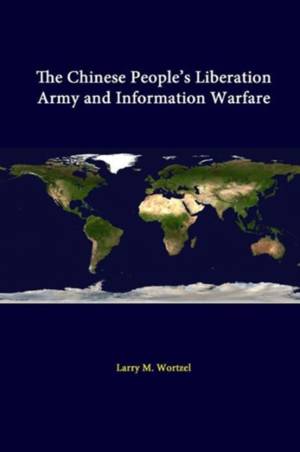
Door een staking bij bpost kan je online bestelling op dit moment iets langer onderweg zijn dan voorzien. Dringend iets nodig? Onze winkels ontvangen jou met open armen!
- Afhalen na 1 uur in een winkel met voorraad
- Gratis thuislevering in België vanaf € 30
- Ruim aanbod met 7 miljoen producten
Door een staking bij bpost kan je online bestelling op dit moment iets langer onderweg zijn dan voorzien. Dringend iets nodig? Onze winkels ontvangen jou met open armen!
- Afhalen na 1 uur in een winkel met voorraad
- Gratis thuislevering in België vanaf € 30
- Ruim aanbod met 7 miljoen producten
Zoeken
The Chinese People's Liberation Army And Information Warfare
Larry M Wortzel, Strategic Studies Institute, U S Army War College
Paperback | Engels
€ 22,45
+ 44 punten
Omschrijving
On November 23, 2013, China's Ministry of National Defense spokesman announced that a new air defense intercept zone (ADIZ) will be established by the government to include the Diaoyu, or Senkaku Islands. Sovereignty over these islands is disputed by Japan, China, and Taiwan. The new ADIZ also included a submerged rock that falls inside overlapping Exclusive Economic Zones (EEZ) claimed by China, Japan, and South Korea. Pundits and policy analysts quickly engaged in a broad debate about whether China's expanded ADIZ is designed to create tension in Asia, or is part of a broader plan to impose a new definition of China's territorial space in the Asia-Pacific region. Meanwhile, to deal with cyber penetrations attributed to the Chinese People's Liberation Army (PLA), the U.S. Departments of Justice, Homeland Security, and State are devising new means to protect intellectual property and secrets from the PLA's computer network operations.
Specificaties
Betrokkenen
- Auteur(s):
- Uitgeverij:
Inhoud
- Aantal bladzijden:
- 80
- Taal:
- Engels
Eigenschappen
- Productcode (EAN):
- 9781312278219
- Verschijningsdatum:
- 14/06/2014
- Uitvoering:
- Paperback
- Formaat:
- Trade paperback (VS)
- Afmetingen:
- 152 mm x 229 mm
- Gewicht:
- 127 g

Alleen bij Standaard Boekhandel
+ 44 punten op je klantenkaart van Standaard Boekhandel
Beoordelingen
We publiceren alleen reviews die voldoen aan de voorwaarden voor reviews. Bekijk onze voorwaarden voor reviews.











